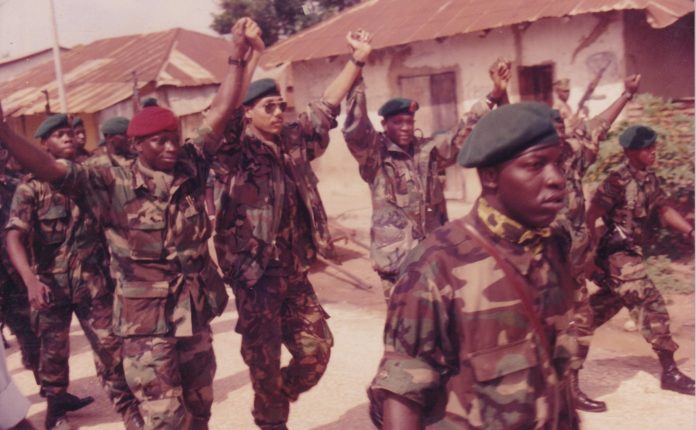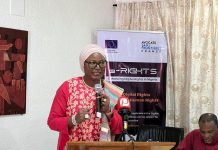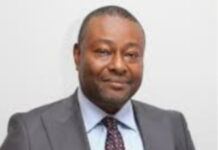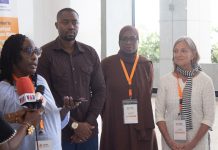By Yankuba Jallow
Lieutenant Amadou A. Suwareh has told the Commissioners of the TRRC that he was the commander of the troops that overthrew the PPP government in 1994.
Suwareh was testifying before the Truth Reconciliation and Reparations Commission (TRRC) on Wednesday the 9 January 2018.
He said he was the leader of Yahya Jammeh and all the soldiers who overthrew the government of former President Dawda K. Jawara on the 22nd July 1994.
Suwareh said it was Jawara’s government who had prepared their own coup.
In his evidence, the 62-year-old retired soldier said he joined the Gendarmerie in the year 1982 when it was newly founded.
“The Senegalese Gendarmerie were responsible to guard President Jawara because the Gendarmerie of the Gambia was not well equipped,” he said.
He said he was a Lieutenant but he was demoted to the rank of 2nd Lieutenant. Suwareh added that he was dissatisfied with this, then he wrote a letter to the Ministry of the Interior where the decision to demote him was reversed because it wasn’t a correct decision.
He said after his recruitment training in 1983, he was taken to the Mobile Gendarmerie and they were responsible for peacekeeping and maintaining the morale of the troops. He averred that he was the commander of the Tactical Support Group (TSG) stationed at the Fajara Barracks.
He stated that after the amalgamation of the Gendarmerie to the Army, he was posted at the Yundum Barracks as the Commanding Officer in Western Division (now called the West Coast Region). He said he was responsible for the whole Western Division.
On the TSG, Suwarh said he wasn’t satisfied with it because it was not equipped.
He narrated that the Jawara regime brought in Nigerian soldiers in the Gambia who were the commanders for the Gambia soldiers. He added that the foreigners were provided with money and other amenities but the Gambian soldiers were not provided with such. Even those who went to Liberia for peacekeeping mission weren’t paid their dues.
“The Gambian soldiers were juniors to Nigerian soldiers. The Gambian soldiers were only Lieutenants and that was why the Lieutenants joined hands and did the coup,” he said.
On his relationship with Jammeh, Suwareh said Jammeh used to wipe his boots for him and that he had a very strong cordial relationship with Jammeh.
“Jammeh was rude to his seniors but he respected me. He used to call me son although I was his senior and older than him. He used to bring my lunch for me,” Suwareh adduced.
On events before the 22nd July 1994, Suwareh said President Jawara (as he then was) was expected to land in the Gambia on the 21st July from the United Kingdom. He said he was called by Chief Superintendent Turo Jawneh that there are some elements in the army who planned to stage a coup. He said the security at the airport was tightened up and security personnel were placed at major junctions from the airport to Banjul.
“We secured the airport (Banjul International Airport) with more security elements and we had in our possession weapons. The whole airport was secured,” he said.
After the guard of honour, he said some elements of the Nigerian Army disarmed the military police officers present at the airport. He added that the guard of honour wasn’t armed because they have empty guns for ceremonial purposes.
“The commander of the military police was Lieutenant Yahya Jammeh. The military police used to have pistols on their sideways and they were all taken from them. The members of the Tactical Support Group weren’t disarmed,” he said.
Suwareh said that was humiliating because it could have been done at the barracks. He added the people that went there to welcome the president all laughed at the military police officers.
“I felt humiliated because that could have been done at the Barracks although the President went to Banjul and no one was arrested,” he said.
Suwareh said the information he later gathered was that Jammeh and other soldiers regrouped themselves at the Yundum Barracks.
On the following day, that happened to be the 22nd July 1994, the witness said his senior Turo Jawneh gave him an order to close down the Denton Bridge and to shot any military officer coming towards Banjul. Suwareh said, thereafter, he ordered for his elements (men) to be given weapons from the Amoury. He confirmed that he received the same orders from IG Pa Sallah Jagne and Assistant IG Chongan.
“I was with Warrant Officer 2 Alagie Martins, Coporal Mbye and others. We were 48 all together and we arrived at the Denton Bridge at around 8 am,” he said.
“When we arrived at the (Denton) Bridge, I assembled my men and ordered that none of them should shoot until I give the order for them to do so,” he adduced.
He said his men complied with the order he made and he deployed them to take charge of the Bridge on both sides. He added that around 9 am, he says they saw a group of soldiers coming in tactical force.
“I saw them dropping from GPTC minibuses and when I counted them, they were about 30 to 40 soldiers. They were moving in a combat movement because they were ready for a fight. All those in the group were ready for battle. They were completely ready to fight. They have RPG, AK47, rocket propel grenades, general purpose machine guns and many other guns,” he said.
He said he went to meet them and Corporal Tumbul Tamba was the leader of the unit and it was unusual for a corporal to handle such unit.
“When I asked him what was his mission, Tamba told me that he was going to Banjul for a mission. He told me that his officers were behind coming. He was smelling with alcohol,” he said.
Suwareh told the commissioners that he didn’t allow Tamba and his unit to pass and he established a buffer zone of about 100 meters between his men and Tamba’s unit. He said still at this time, the civilians were at the Bridge waiting to cross the Bridge.
“We saw other GPTC buses coming on the sideways of the road and Tamba went to meet them. Later, Tamba came with a white handkerchief meaning he wanted to talk to me,” he said.
He said: Tamba told me that Yahya said he wanted to talk to me. I asked Tamba to call him to where I was then Yahya, 2nd Lieutenant Edward Singhateh and Captain Sonko alias ‘Kankurang’ came to me alongside Tamba but I chased Tamba because he was not an officer at that time.”
“Yahya told me that they want to take over the government because of corruption. I smell alcohol on all of them,” he said,
“Are you saying Yahya drinks alcohol,” asked the lead Counsel.
“Of course. I know Yahya drinks and this is not a secret,” he adduced.
“Yahya told me that there was corruption in the PPP government and they were going to overthrow him and hand over the government to another civilian,” Suwareh stated.
Suwareh explained that he was offered a cabinet position by Jammeh at the Bridge but he declined the position.
“When I see them, I know my men cannot stop them. They have more sophisticated weapons than my men. The weapons they have, we don’t have them. It was impossible for the police to stop them because the Army was more equipped than the police,” he said.
“I told them I will join them but I will be in command up to the State House. I did so in protection of life and property because I know these soldiers will kill us in less than 10 minutes if we resist them. They agreed and I led them from the Denton Bridge to the State House,” he said.
He said he convinced his men to join the coup makers to which they all complied and joined them.
“I asked them to change their berets from grey to black because the coup makers were having black berets. They shook hands and they became friends. I didn’t change mine because I want to convince others to join us,” he said.
He said he was ahead of the coup makers to convince his men stationed at different areas in Banjul to surrender and join the coup makers.
“I was the only one who can do that at that instance. I asked Jammeh and his men to walk because they wanted to use the vehicles and rush into Banjul not knowing that there were many security personnel in Banjul waiting to shoot them because the order was to shoot any soldier coming towards Banjul,” he said.
“Why did you do that?” asked the lead Counsel.
“I did that to save life and property. I was the most senior officer in the group and I know people were stationed in Banjul to shoot us,” he said.
He said ASP Harry Valentine, Inspector Sanyang, and some other men fired at the coup makers to stop them.
“I was raising my rifle up and calling the names of those who were firing at us to stop. I also shouted at my people (Jammeh and co) not to fire back. After a period of about two minutes, I asked those who were firing to come out and we disarmed them and their weapons were put in a truck,” he said.
“I told them that it was a coup and we had no chance of stopping them. We continued to Banjul in a tactical formation,” he said.
“Tactical formation means a movement made by the military when going for a war where those in the front stay and those at the back pass over and the process continues,” he said.
He said when they reached the Christian Cemetery in Banjul, he met Lieutenant Binni Minteh, who was leading the Mobile Unit on that day with his men.
“I told him that as far as we cannot stop them, we have to join them and he complied. Minteh and his men joined us,” he said.
“Why don’t you carry out the order of your seniors to shoot at a distance?” asked Commissioner Jallow.
“When I assessed the situation, I know what I had and what we can do. Most of the men in the coup were drunk and they could have killed my men. They were more armed than us and it does not make sense to fight these soldiers because they will massacre us in less than 10 minutes,” he replied.
He explained that when they reached the roundabout in Banjul, he divided the troops into two groups. Group 1 was headed by Edward Singhateh and Group 2 was headed by himself. He said Yahya Jammeh was in Group 2. He said Group 1 used the Independence Drive whilst Group 2 used the Marina Parade route.
“I made that decision because it is not safe to put all your eggs in one basket,” he said.
He said he and Jammeh decided to take the Marina Parade because the defence headquarters is situated along that route.
“When we arrived at the NSS, Yaya wanted to shoot but I told him that these are people who weren’t armed. When we reached the Army Headquarters, we met only one Sergeant who told us that no soldier reported for work on that day. I convinced him to join us and he assured us of his support” Suwareh said.
He said at the State House, the Guard Commander, Lie Badjie initially refused the coup but when he looked and saw his men, he decided to be part of the coup. He added that at that time, Lang Tombong Tamba was the most senior State House guard.
He said the State House gate was opened for them and Yahya Jammeh asked Lang Tombong to assemble all the soldiers.
“Did Yahya address them?” the counsel asked.
“Yes, he did. He told them that they have overthrown the government because it was corrupt,” Suwareh testified.
The witness said after the assembly, he told Edward and Yahya that the State House is theirs and it is finished now.
“What role were you given?”
“I was given the role of policing the security personnel so that they won’t act excessively,” he said.
He added that at the time of his appointment, soldiers do go to petrol stations and take fuel without paying.
“On August 18, 1994, I was given a letter that I was appointed as a Commissioner of North Bank Division and I accepted the appointment.
About two years later, Jammeh relieved him from the Commissioner position and redeployed him to the ARMY with a major rank.
“A week later, I was deployed to the police and tasked to form the PIU and I was later made the head of the drug squad,” he concluded.
Sittings Continues today.



















